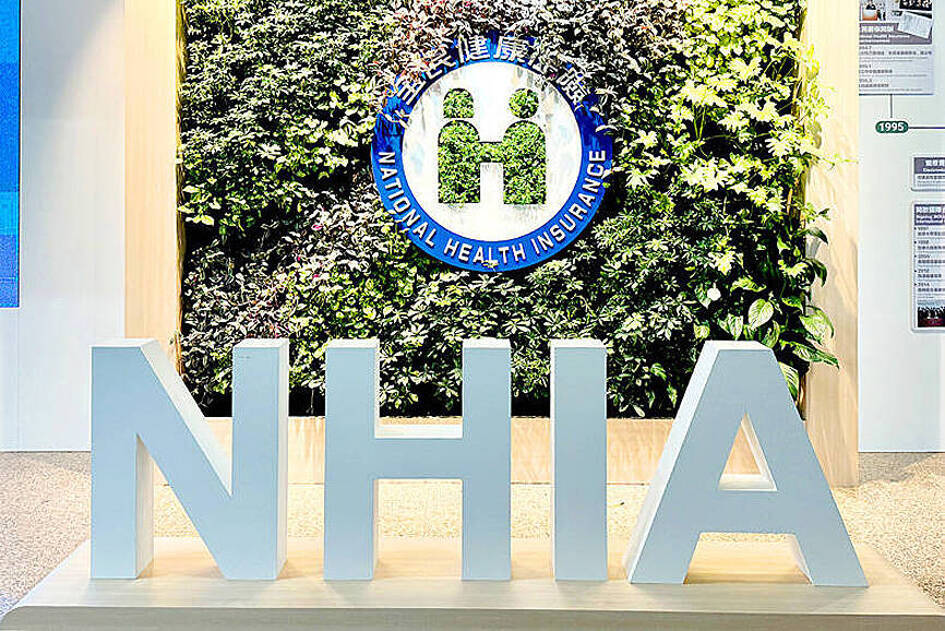The National Health Insurance Administration (NHIA) is considering how to adjust the National Health Insurance (NHI) supplementary premium rate to address the increasing NHI global budget, NHIA Director-General Shih Chung-liang (石崇良) said yesterday.
As the NHI system has been running for nearly 30 years, it is facing multiple challenges, including a rapidly aging society, a rise in the number of people with chronic illnesses, a shrinking working population due to a low birthrate and uneven distribution of medical resources, Shih said at a forum organized by the Taipei Doctors’ Union in Taipei.
He was invited to the forum to speak about the state of the NHI system and potential reforms.

Photo: Chiu Chih-jou, Taipei Times
While the NHI global budget for next year has not been decided, a high estimate is that it would increase by about NT$53.1 billion (US$1.65 billion), or 6.06 percent, from this year, he said.
With additional government funding of about NT$1.11 billion, a special fund of NT$5 billion for new cancer drugs and NT$2 billion for medicines for rare diseases, the growth rate would be about 8.13 percent, the highest on record, he said.
However, the NHI premium rate has only been increased twice in nearly three decades — from 4.25 percent to 4.55 percent and to 5.17 percent, he said, adding that it is unbelievable that the system has lasted until now.
Its financial structure should be adjusted to meet the expanding NHI global budget, he said.
Seventy-five percent of the NHI budget comes from general premium payments by insured people, mostly salaried workers, about 9 percent is from supplementary premiums, and the rest is from the government and special funds, he said.
The supplementary premium is imposed on employers and insured people who earn more than NT$20,000 per year from six non-salary sources: stock dividends, interest, second jobs, rent, professional practices and bonuses in excess of four times their monthly salary, he said.
The agency is considering decoupling the general premium and the supplementary premium rates, and possibly even separating the six non-salary sources, setting independent rates for each of them, as well as adding new non-salary sources for collecting the supplementary premium, he said.
The growth of family income does not necessarily coincide with the nation’s overall economic growth, so considering generational equity, the agency does not want to put too much burden on salaried workers by raising the general premium rate too fast, Shih said.
The NHI had a surplus for the past two years, but that was not due to the general premium — which was 5.17 percent — but rather from supplementary premiums collected from stock dividends, he added.
The government should share more of the burden by expanding the NHI budget sources, such as no longer limiting it to tobacco health and welfare surcharges, and the annual government budget, he said.
It could collect a percentage of other taxes, Shih said.
However, the ideas need to be discussed further and laws would have to be amended, he added.
Additional reporting by CNA

Taiwan is to commence mass production of the Tien Kung (天弓, “Sky Bow”) III, IV and V missiles by the second quarter of this year if the legislature approves the government’s NT$1.25 trillion (US$39.78 billion) special defense budget, an official said yesterday. Commenting on condition of anonymity, a defense official with knowledge of the matter said that the advanced systems are expected to provide crucial capabilities against ballistic and cruise missiles for the proposed “T-Dome,” an advanced, multi-layered air defense network. The Tien Kung III is an air defense missile with a maximum interception altitude of 35km. The Tien Kung IV and V

The disruption of 941 flights in and out of Taiwan due to China’s large-scale military exercises was no accident, but rather the result of a “quasi-blockade” used to simulate creating the air and sea routes needed for an amphibious landing, a military expert said. The disruptions occurred on Tuesday and lasted about 10 hours as China conducted live-fire drills in the Taiwan Strait. The Civil Aviation Administration (CAA) said the exercises affected 857 international flights and 84 domestic flights, affecting more than 100,000 travelers. Su Tzu-yun (蘇紫雲), a research fellow at the government-sponsored Institute for National Defense and Security Research, said the air

Trips for more than 100,000 international and domestic air travelers could be disrupted as China launches a military exercise around Taiwan today, Taiwan’s Civil Aviation Administration (CAA) said yesterday. The exercise could affect nearly 900 flights scheduled to enter the Taipei Flight Information Region (FIR) during the exercise window, it added. A notice issued by the Chinese Civil Aviation Administration showed there would be seven temporary zones around the Taiwan Strait which would be used for live-fire exercises, lasting from 8am to 6pm today. All aircraft are prohibited from entering during exercise, it says. Taipei FIR has 14 international air routes and

Taiwan lacks effective and cost-efficient armaments to intercept rockets, making the planned “T-Dome” interception system necessary, two experts said on Tuesday. The concerns were raised after China’s military fired two waves of rockets during live-fire drills around Taiwan on Tuesday, part of two-day exercises code-named “Justice Mission 2025.” The first wave involved 17 rockets launched at 9am from Pingtan in China’s Fujian Province, according to Lieutenant General Hsieh Jih-sheng (謝日升) of the Office of the Deputy Chief of the General Staff for Intelligence at the Ministry of National Defense. Those rockets landed 70 nautical miles (129.6km) northeast of Keelung without flying over Taiwan,